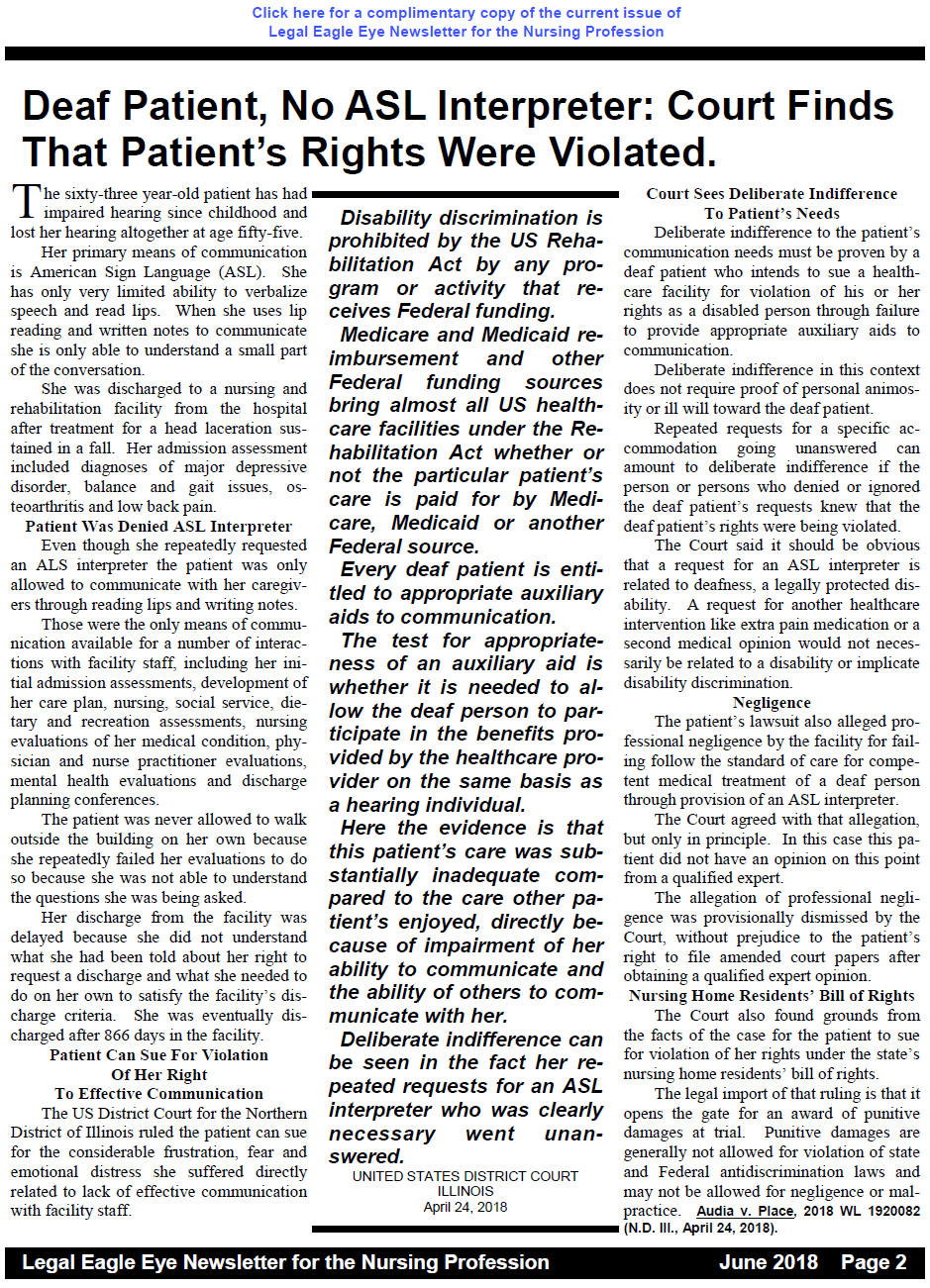
Deaf Patient, No ASL Interpreter: Court Finds That Patient's Rights Were Violated.
Disability discrimination is prohibited by the US Rehabilitation Act by any program or activity that receives Federal funding.
Medicare and Medicaid reimbursement and other Federal funding sources bring almost all US healthcare facilities under the Rehabilitation Act whether or not the particular patient's care is paid for by Medicare, Medicaid or another Federal source.
Every deaf patient is entitled to appropriate auxiliary aids to communication. The test for appropriateness of an auxiliary aid is whether it is needed to allow the deaf person to participate in the benefits provided by the healthcare provider on the same basis as a hearing individual.
Here the evidence is that this patient's care was substantially inadequate compared to the care other patient's enjoyed, directly because of impairment of her ability to communicate and the ability of others to communicate with her. Deliberate indifference can be seen in the fact her repeated requests for an ASL interpreter who was clearly necessary went unanswered. UNITED STATES DISTRICT COURT ILLINOIS April 24, 2018
The sixty-three year-old patient has had impaired hearing since childhood and lost her hearing altogether at age fifty-five. Her primary means of communication is American Sign Language (ASL). She has only very limited ability to verbalize speech and read lips. When she uses lip reading and written notes to communicate she is only able to understand a small part of the conversation.
She was discharged to a nursing and rehabilitation facility from the hospital after treatment for a head laceration sustained in a fall. Her admission assessment included diagnoses of major depressive disorder, balance and gait issues, osteoarthritis and low back pain.
Even though she repeatedly requested an ALS interpreter the patient was only allowed to communicate with her caregivers through reading lips and writing notes. Those were the only means of communication available for a number of interactions with facility staff, including her initial admission assessments, development of her care plan, nursing, social service, dietary and recreation assessments, nursing evaluations of her medical condition, physician and nurse practitioner evaluations, mental health evaluations and discharge planning conferences.
The patient was never allowed to walk outside the building on her own because she repeatedly failed her evaluations to do so because she was not able to understand the questions she was being asked. Her discharge from the facility was delayed because she did not understand what she had been told about her right to request a discharge and what she needed to do on her own to satisfy the facility's discharge criteria. She was eventually discharged after 866 days in the facility.
The US District Court for the Northern District of Illinois ruled the patient can sue for the considerable frustration, fear and emotional distress she suffered directly related to lack of effective communication with facility staff. Deliberate indifference to the patient's communication needs must be proven by a deaf patient who intends to sue a healthcare facility for violation of his or her rights as a disabled person through failure to provide appropriate auxiliary aids to communication. Deliberate indifference in this context does not require proof of personal animosity or ill will toward the deaf patient. Repeated requests for a specific accommodation going unanswered can amount to deliberate indifference if the person or persons who denied or ignored the deaf patient's requests knew that the deaf patient's rights were being violated.
The Court said it should be obvious that a request for an ASL interpreter is related to deafness, a legally protected disability. A request for another healthcare intervention like extra pain medication or a second medical opinion would not necessarily be related to a disability or implicate disability discrimination.
The patient's lawsuit also alleged professional negligence by the facility for failing follow the standard of care for competent medical treatment of a deaf person through provision of an ASL interpreter. The Court agreed with that allegation, but only in principle. In this case this patient did not have an opinion on this point from a qualified expert. The allegation of professional negligence was provisionally dismissed by the Court, without prejudice to the patient's right to file amended court papers after obtaining a qualified expert opinion.
The Court also found grounds from the facts of the case for the patient to sue for violation of her rights under the state's nursing home residents' bill of rights. The legal import of that ruling is that it opens the gate for an award of punitive damages at trial. Punitive damages are generally not allowed for violation of state and Federal antidiscrimination laws and may not be allowed for negligence or malpractice. Audia v. Nursing Home, 2018 WL 1920082 (N.D. Ill., April 24, 2018).